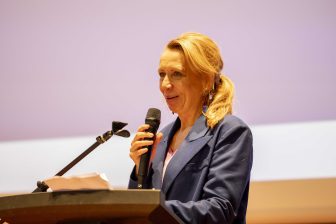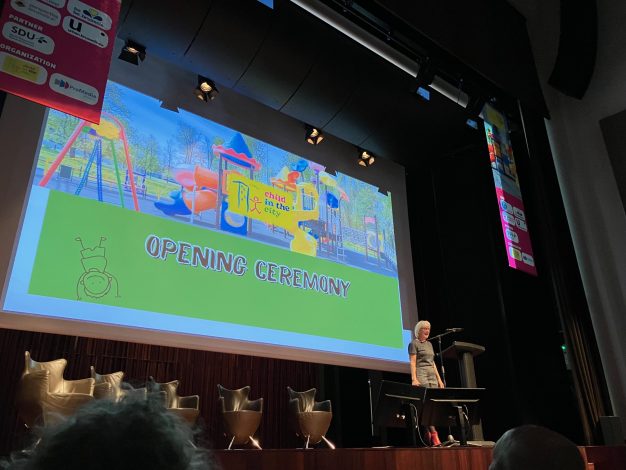
Child in the City World Conference 2023 – Day 1
The time is finally here…after months of preparation, we are able to welcome you all to Brussels for our flagship world conference.
Building the Future is our theme for 2023, and from 20-22 November we are providing you with a diverse and engaging programme of keynote speakers, presentations and field trips.
Our conference was officially opened on Monday at 0915 with a welcome from Lia Karsten, President of the Scientific Committee of the Child in the City Foundation. “Sharing ideas between professionals, disciplines and cities can make us all stronger,” she said, as she referred to the five core themes being focused on this week:
- Building on Creativity
- Building on intergenerational cohesion
- Building on (international) solidarity
- Building on participation and democracy
- Building on young people-friendly urban space
“I am really proud of the excellent programme we have prepared for this week,” she added.
Lia was followed by a panel discussion involving Elke Van den Brandt: Minister of Mobility, Public Works, and Traffic Safety; Sven Gatz: Minister of Finance and Budget of the Brussels-Capital Region, and Ans Persoons, Brussels Secretary of State for Urbanism and Youth.
Ms Persoons highlighted the need for including children in the urban planning process, saying: “I think it’s always necessary to get the input of children in play facilities – if you want to have an inclusive city, it’s very important to have other ways of participation.”
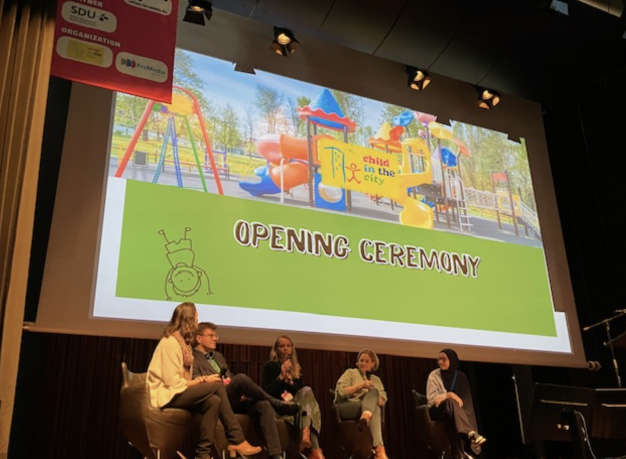
Ms van den Brandt then talked about a child-friendly tradition which has become very popular with Brussels citizens – the car-free Sunday. On one day a year, we take the cars away and make it a big playground. You can see the happiness on people’s faces. It’s the favourite day of the year for many people – for me this is the cherry on the cake,” she said.
The first of our keynote presentations then saw Bruno Vanobbergen (below), Director General of Opgroieien, reflect on ‘the need for an educational environment that takes care of the world’.

“We need to challenge children to question their wishes and desires,” he said.
“It is imagination that allows children to open up the boundaries of their experiences.”
“We opt for an integrated, multidisciplinary approach – in this way, children and their families are given maximum support.”
“While services are available to everyone, the scale should be greater for those with greater needs.”
He put forward four proposals:
- Cities need to create spaces where children, young people and adults can meet, focusing on dialogue and social cohesion
- Cities can play a crucial role in implementing an inclusive approach as something normal
- Cities need to pay more attention to trauma and mental problems of children and their families
- Local and central authorities need to collaborate in order to ensure that all families have access to the financial and material support that they have the right to.
‘I hope this will inspire you to develop the kind of solidarity between all children, young people and families in this world, in our world – let’s take care of this,’ he concluded.
He was followed by Mona Meieinberg of UNICEF Switzerland and Liechtenstein, who began by highlighting a prediction by the United Nations that two thirds of the world’s population will be living in urban areas by 2035.
As a result, she said, extreme population growth, densification and global warming will lead to changing social and cultural patterns and behaviours, which ‘pose multiple challenges to the implementation of child friendly living spaces’.
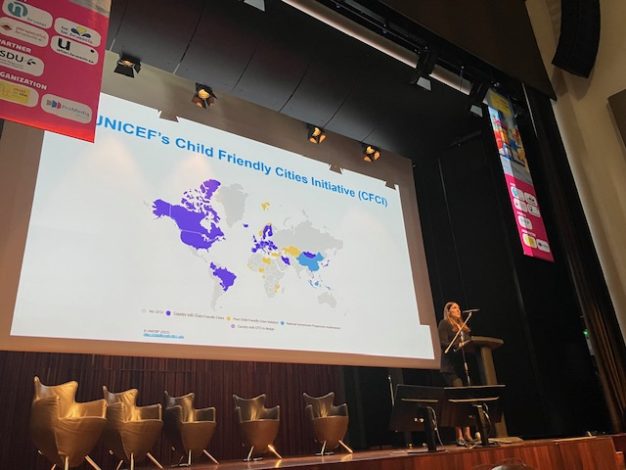
“We must make sure we put the best interests of the child at the heart of urban planning,” said Mona. “We don’t just talk about playgrounds, but all the spaces in-between. They are always moving and so these are important spaces.
“With Article 6 (of the UN Convention on the Rights of the Child), we must also have health prevention strategies in place. We know from research that the mental and physical health have correlation – one affects the other. We need to make sure that children are being heard. We need to take them seriously in the decision-making processes.”
She also referenced the telling words of a 12 year old child in Switzerland, who said: ‘Children should have more say in things…because grown-ups deciding on what a new playground will look like is weird’.
‘Great potential at the municipal level’
“We have to be considerate – we have to actively involve children and young people in the planning, design and utilization of spaces.
“If all this is anchored in legisation and policy, then the chances of success are much higher.”
The main challenges, she said, were:
- competition over spaces – such as public spaces & road traffic
- shared responsibilities and interdisciplinary cooperations and collaborations – the competing dynamics between a municipality’s building & child/youth departments
- Limited opportunities for children and young people to participate
Mona Meienberg`: Adults often laugh away suggestions without really listening.
“We know that the planning and design of child friendly living spaces is not implemented in a lot of examples but this is not done maliciously,” added Mona, referencing the UNICEF Planning and designing child-friendly living spaces document.
“Child friendly urban planning is a cross-sectional task – we need experts from all sorts of areas. Every one of you can be part of this, by signing petitions, by giving children a voice.
To conclude, she said, ‘a city for children is a city for all’.
“If we build cities for children, we build cities for all.”
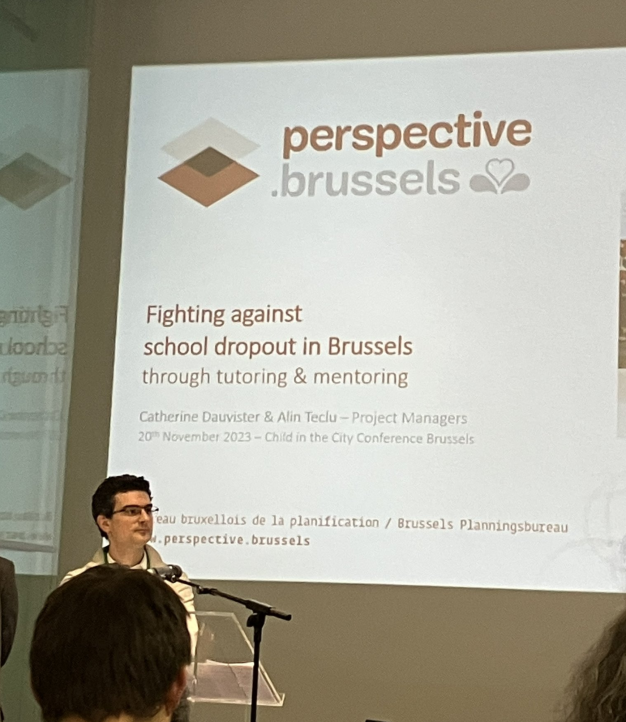
The rest of the day was dedicated to a series of parallel sessions, each one comprising two or three small presentations from a variety of child and urban-focused experts, with a question & answer session following each presentation. These included:
- A presentation from Perspective Brussels, with details of how the city has been tackling school dropout rates through a combination of tutoring and mentoring. Project managers Alin Teclu (above) and Catherine Dauvister explained how Brussels Capital Region supports tutoring and mentoring projects through its school dropout policy, ‘encouraging intergenerational exchanges’ with a view to contributing to the educational, social and spatial integration of young people in Brussels.
- Sally Power, co-director of the Wales Institute of Social and Economic Research Data (WISERD) shared the findings of a study which compared the UNICEF Child Friendly Cities Initiative in three separate cities and countries – England (Redbridge), USA (Houston) and France (Lyon).
- A video from Play Wales (image below), entitled ‘This is why play is so important’, which features interviews with both children and adults from right across Wales, who highlight the many benefits that play can bring, such as new skills, independence and friendships.
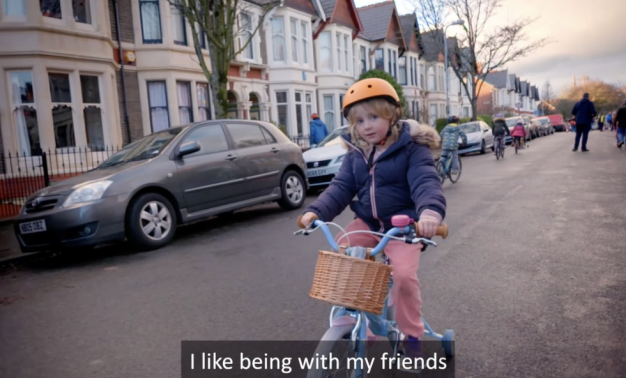
Follow the conference via our social media channels, and contribute using the hashtag #citcbrussels2023




